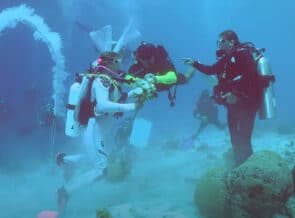New research by scientists from the University of Oxford, British Geological Survey, and Portugal’s Marine and Environmental Sciences Center shows that the black-browed albatross (Thalassarche melanophris) can dive to much greater depths (19 m, or 62 feet) and for much longer (52 seconds) than previously thought — three times the maxima previously recorded for this species (6 m, or 20 feet, and 15 seconds), and more than twice the maxima reliably recorded previously for any albatross.
“Albatrosses (family Diomedeidae) are the iconic aerial wanderers of the oceans, supremely adapted for long-distance dynamic soaring flight,” said University of Oxford’s Professor Tim Guilford and his colleagues.
“Perhaps because of this they are considered poorly adapted for diving, in contrast to many smaller shearwater and petrel relatives, despite having amphibious eyes, and an a priori mass advantage for oxygen-storage tolerance.”
“Modern biologging studies have largely confirmed this view, casting doubt on earlier observations using capillary tube maximum depth gauges, which may exaggerate depths, and emphasizing albatrosses’ reliance on near-surface feeding.”
“Nevertheless, uncertainty about albatross diving remains an important knowledge gap since bycatch in human fisheries (e.g. birds becoming hooked when diving for longline bait fish) is thought to be driving many population declines in this most threatened group of birds.”
Using miniature electronic depth loggers, the researchers documented the journeys of the black-browed albatross population in the Falklands commuting to the South American coast and diving at unexpected depths to pursue prey.
“A better understanding of the unobserved behavior of the albatrosses and other endangered seabirds is essential to conservation efforts,” said University of Oxford’s Dr. Oliver Padget.
“That black-browed albatrosses are physically capable of such deep dives will now need to be considered when thinking about the effectiveness of mitigation strategies that rely on the species being restricted to the surface.”
Diving activities recorded amongst the population took place during the day, suggesting that the albatrosses rely on their vision to pursue shoaling prey on deeper dives.
“We found that deep diving was restricted to daylight hours, and so one potential mitigation could be for pelagic long lines to be set at night when albatross might be less likely, or able, to chase baits and become caught,” Dr. Padget said.
“Diving in this population could be the result of previously unseen behavioral flexibility, and have important consequences for how we think about the risks to threatened species, and for how they might respond to change,” Professor Guilford said.
The findings appear in the journal Current Biology.
_____
Tim Guilford et al. 2022. Unexpectedly deep diving in an albatross. Current Biology 32 (1): R26-R28; doi: 10.1016/j.cub.2021.11.036
Note: This article have been indexed to our site. We do not claim legitimacy, ownership or copyright of any of the content above. To see the article at original source Click Here














